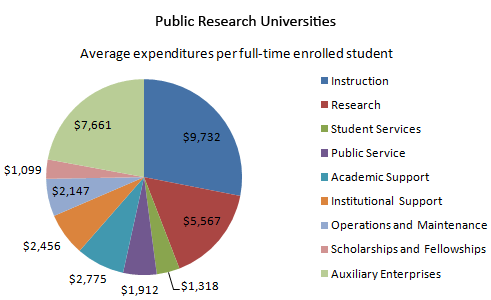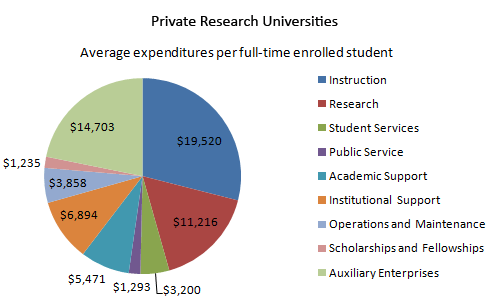While it seems like more and more colleges are spending lavishly to increase their prestige (this can be seen in the luxury dorms going up on campuses), it would be nice to know where all this tuition money is going.
Every college obviously spends money differently, but here we will take a look at the averages for public and private institutions. Spending for public and private 4-year institutions has increased steadily over the past 10 years, with student tuition covering significantly more of the educational costs over that period.
Recommended Resources:


About the expenses:
Instruction: Activities directly related to instruction. This includes faculty salaries and benefits, office supplies, administration of academic departments, and the proportion of faculty salaries going to departmental research and public service.
Research: Sponsored or organized research, research centers, and project research. These costs are usually budgeted separately from other institutional spending, through special funds restricted to these purposes.
Public Service: Activities established to provide non-instructional services to external groups. These costs are also budgeted separately and include conferences, reference bureaus, cooperative extension services, and public broadcasting.
Student Services: Can include non-instructional, student-related activities such as admissions, student recruitment , registrar services, career counseling, financial aid administration, student organizations, and intramural sports.
Academic Support: Activities that support instruction, research, and public service, including: libraries, computer labs, museums, central academic administration (dean’s offices), and curriculum and course development.
Institutional support: General administrative services, executive management, legal and fiscal operations, public relations, and central operations for physical operation.
Scholarships and fellowships net of allowances: Institutional spending on scholarships and fellowships net of allowances does not include federal aid, tuition waivers, or tuition discounts; it is a residual that captures any remaining aid after it is applied to tuition and auxiliaries.
Plant operation and maintenance: Service and maintenance of the physical plant, grounds and buildings maintenance, utilities, property insurance and similar items.
Auxiliary enterprises, hospitals, independent, and other operations: User fee activities that do not receive general support. Auxiliary enterprises include dormitories, bookstores, and meal services.